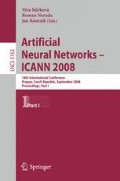Abstract
In this paper, we study an emergence of game strategy in multiagent systems. Symbolic and subsymbolic approaches are compared. Symbolic approach is represented by a backtrack algorithm with specified search depth, whereas the subsymbolic approach is represented by feed-forward neural networks that are adapted by reinforcement temporal difference TD(λ) technique. We study standard feed-forward networks and mixture of adaptive experts networks. As a test game, we used the game of simplified checkers. It is demonstrated that both networks are capable of game strategy emergence.
Access this chapter
Tax calculation will be finalised at checkout
Purchases are for personal use only
Preview
Unable to display preview. Download preview PDF.
References
Sutton, R.S.: Learning to predict by the method of temporal differences. Machine Learning 3, 9–44 (1988)
Sutton, R.S., Barto, A.G.: Reinforcement Learning: An Introduction. MIT Press, Cambridge (1998)
Tesauro, G.J.: Practical issues in temporal difference learning. Machine Learning 8, 257–277 (1992)
Tesauro, G.J.: TD-gammon, a self-teaching backgammon program achieves master-level play. Neural Computation 6(32), 215–219 (1994)
Tesauro, G.: Temporal difference learning and td-gammon. Communications of the ACM 38(3), 58–68 (1995)
Pollack, J., Blair, A., Land, M.: Coevolution of a backgammon player. In: Langton, C.G. (ed.) Proc. of Artificial Life V, pp. 92–98. MIT Press, Cambridge (1996)
Chellapilla, K., Fogel, D.B.: Evolving neural networks to play checkers without expert knowledge. IEEE Trans. Neural Networks 10(6), 1382–1391 (1999)
Chellapilla, K., Fogel, D.B.: Evolution, neural networks, games, and intelligence. Proc. IEEE 87(9), 1471–1496 (1999)
Chellapilla, K., Fogel, D.B.: Evolving an expert checkers playing program without using human expertise. IEEE Transactions on Evolutionary Computation 5(4), 422–428 (2001)
Zaman, R., Wunsch III, D.: TD methods applied to mixture of experts for learning 9x9 go evaluation function. In: IJCNN 1999 vol. 6, pp. 3734–3739 (1999)
Jordan, M., Jacobs, R.: Modular and hierarchical learning systems. The Handbook of Brain Theory and Neural Networks. MIT Press, Cambridge (1995)
Author information
Authors and Affiliations
Editor information
Rights and permissions
Copyright information
© 2008 Springer-Verlag Berlin Heidelberg
About this paper
Cite this paper
Lacko, P., Kvasnička, V. (2008). Mixture of Expert Used to Learn Game Play. In: Kůrková, V., Neruda, R., Koutník, J. (eds) Artificial Neural Networks - ICANN 2008. ICANN 2008. Lecture Notes in Computer Science, vol 5163. Springer, Berlin, Heidelberg. https://doi.org/10.1007/978-3-540-87536-9_24
Download citation
DOI: https://doi.org/10.1007/978-3-540-87536-9_24
Publisher Name: Springer, Berlin, Heidelberg
Print ISBN: 978-3-540-87535-2
Online ISBN: 978-3-540-87536-9
eBook Packages: Computer ScienceComputer Science (R0)

